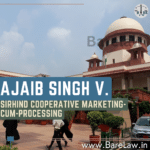
Table of Contents
The Rosher v. Rosher case, decided in 1884, is a landmark judgment in property law | BareLaw
In property law, the Rosher V. Rosher case was a landmark decision under Section 10 of the Transfer of Property Act, 1882. J.B. Rosher’s will involved dispositions made through testamentary, concerning stipulation as to when or how his sons and heirs should sell or lease his land.
What was contested in this case were these conditions which amounted to an absolute restraint on alienation thus void ab initio. This is a determination that had far reaching implications for the interpretation of property laws in relation to testamentary freedom and limitations to land transferability at large; and came delivered as part of the judgement that established its importance in that regard by stating: “Indeed in a way, it is those who have left something they cannot take with them.”
Introduction:
Rosher v. Rosher (1884) 26 Ch D 801 is a signpost case in English property law specially as it visualizes the limits of testamentary freedom and absolute restraints on alienation of one’s property by way of law. This article delves into the details of the case, its judicial reasoning, and its enduring impact on the legal landscape.
Background and Facts:
The case arose from the will made on November 26, 1872 by J.B.Rosher. In particular, he passed his manor house and other real estate to his son Jeremiah Lilburn Rosher and his descendants with some conditions. In instances where his son or heirs desired to dispose off this property during their mother’s lifetime, she was privileged to buy it at a price which was substantially lower then that prevailing in the market for such properties. Moreover, there were restrictions on renting it out. After J.B.Rosher died in 1874 a controversy developed over these terms between his widow and son.
Legal Issues:
The court had to decide whether or not Jeremiah junior and now his descendants could sell mortgage or charge upon the property without first making an offer to sell or lease it back to their wife as required under The wills act. Furthermore, they had also interrogated whether those clauses in the will as concerned sale options are nullity.
Judicial Observations and Decision:
It was observed by the court that mandating disposal at a much lesser value amounted to an absolute prohibition during her life time hence it was invalid. They argued that whatever fraction of worth they sold at regardless of what market cost would be tantamount to not selling at all just like “you shall not sell during widow’s life”.
Implications of the Judgment:
Rosher v Rosher set down an important benchmark in property law. It distinguished any condition which absolutely restrains further transfer is void ab initio. This ruling is significant in understanding the scope and limitations of testamentary freedom, particularly in imposing conditions on property alienation. It serves as a lynchpin in construing Section 10 of the Transfer of Property Act which deals with restraints on alienation.
Conclusion:
Rosher v. Rosher stands for a milestone verdict that defines to what extent testamentary dispositions could burden property transfer. It emphasizes the legal principle that a testator has wide latitude in directing his or her property’s use and transfer but such liberty is not without limits and it is circumscribed by the prohibition against undue restrictions on alienation of property under law. The case remains an important reference point for legal debates surrounding issues such as property rights, testamentary freedom, and the delicate balance between individual autonomy and legal constraints underpinning the laws relating to property ownership.





